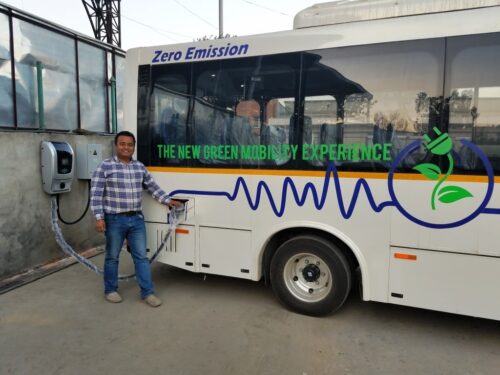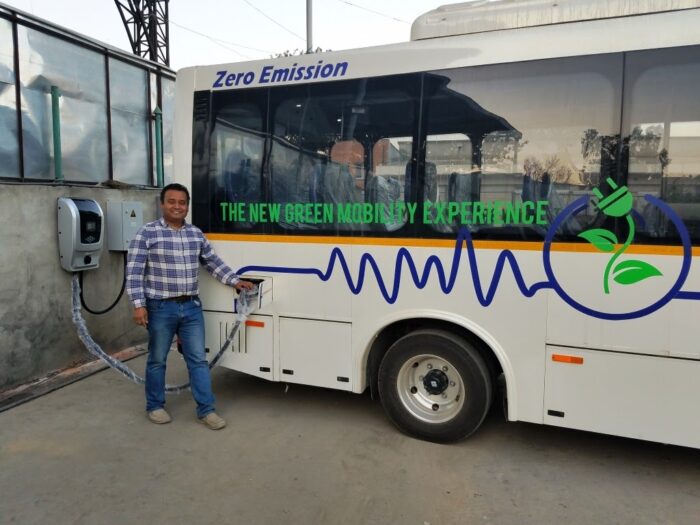Linking Air Pollution and Climate Change in Nepal

Poor air quality and climate change are major challenges facing Nepal. Air pollution poses the second highest risk factor for death and disability in the country, behind only malnutrition. Meanwhile, scientists predict that Nepal will be especially vulnerable to climate change over the next century, with a projected intensification of droughts, heatwaves, river floods, and glacial lake outburst flooding. In recent years, USAID/Nepal has placed greater emphasis on air quality improvement and is in the process of awarding a multi-sectoral air quality activity, the Kathmandu Valley Clean Air Program (KCAP), to reduce air pollution in the Kathmandu Valley.
Mr. Bhushan Tuladhar, a climate change and clean air champion from Kathmandu, Nepal, has spent his career finding ways to address issues and galvanize his community to take action.Through his role as a Board Member of Sajha Yatayat, a public transport cooperative, Mr. Tuladhar is leading an initiative to introduce a fleet of electric buses in Kathmandu. He has also collaborated with the Ministry of Forest and Environment and Climate Analytics to determine Nepal’s Nationally Determined Contributions target on electric mobility. Previously, Mr. Tuladhar led another non-governmental organization (NGO), the Environment and Public Health Organization, which monitors Kathmandu’s ambient air quality for the Government of Nepal. In 2019, he participated in the USAID “Low- and Middle Income Countries Urban Air Pollution Solutions” workshop with other global experts on air pollution issues.
Below is a short Q&A with Mr. Bhushan Tuladhar, an air quality and climate leader. It has been edited for length.

You have worked tirelessly on air quality work in Kathmandu, Nepal. What personally motivates you to do the work that you do?
My children. I want them to breathe clean air.
Your work has involved everything from research to advocacy to engaging the government on air quality and climate issues. Is there a victory you are particularly proud of?
After a lot of lobbying, the Government of Nepal invested in Sajha Yatayat to procure and operate electric buses. Decarbonizing public transport is one of the most effective ways to reduce air pollution, particularly diesel fumes, which contain large amounts of black carbon, a short-lived climate pollutant that is carcinogenic to humans. Since public buses are on the streets for over 12 hours per day, and they operate on diesel, converting them to electric will be a major game changer in the fight against air pollution. Cleaner buses will also invite more people to take the bus, which is also a great social equalizer.
Can you break down the link between air pollution and climate change a little more?
Air pollution is clearly linked to climate change, particularly in countries like Nepal where much of the air pollutants are also short-lived climate pollutants. So reducing air pollution not only improves public health, but also improves the health of the planet. Furthermore, as air pollution is more tangible and easier for people to comprehend than climate change, addressing air pollution can be a low-hanging fruit on the road to climate mitigation.
What advice would you give to other leaders around the world who are fighting for clean air in their communities?
- Keep fighting!
- Inform, engage, and inspire citizens to take action. As Margaret Mead once said, “Never doubt that a small group of thoughtful, committed citizens can change the world; indeed it is the only thing that ever has.”
- Air pollution is the #1 environmental health risk that affects everyone. It is too important an issue to ignore.
Do you have any words of wisdom for the average person, who wants to help improve air quality and do something about climate change in their community? Where should they start?
- Stay informed and inform others.
- Practice what you preach. Reduce your own emissions by walking, cycling, or taking a bus instead of your car. If you do have a car, maintain it regularly. Reduce and recycle waste to the extent possible. And choose environment-friendly products and services.
- Raise your voice for clean air and climate action.

